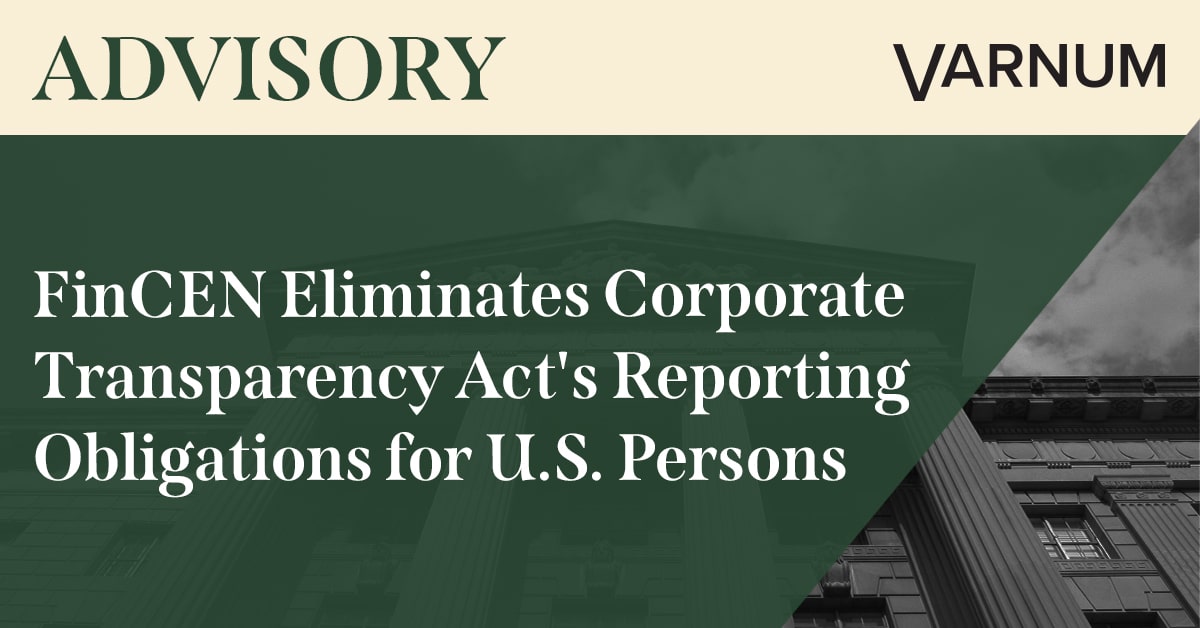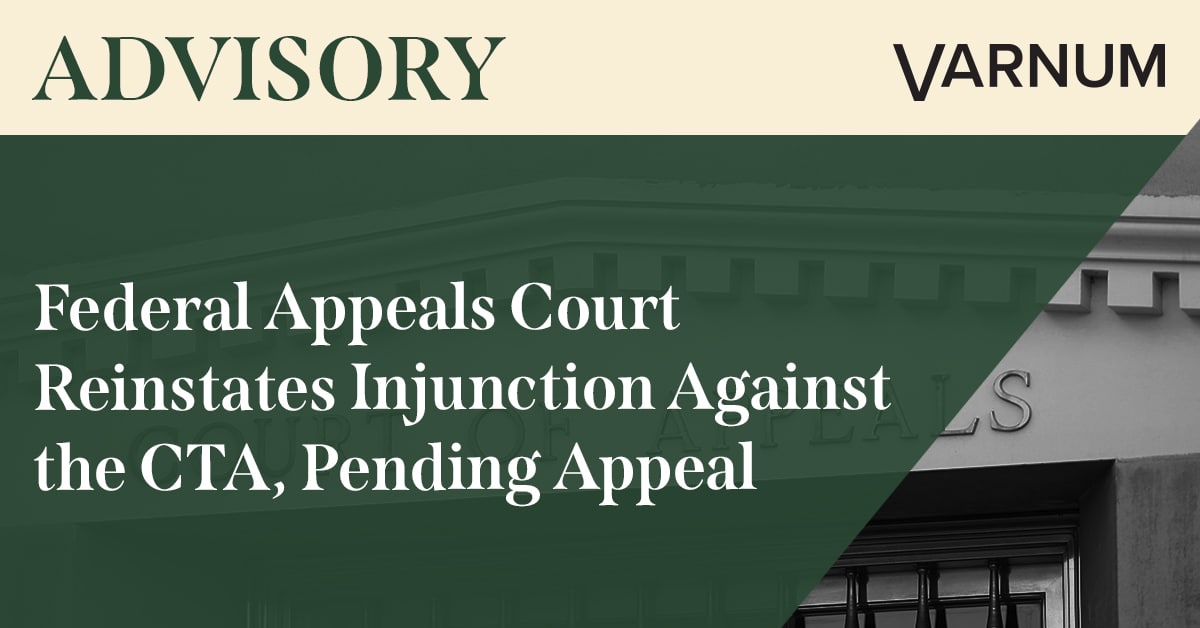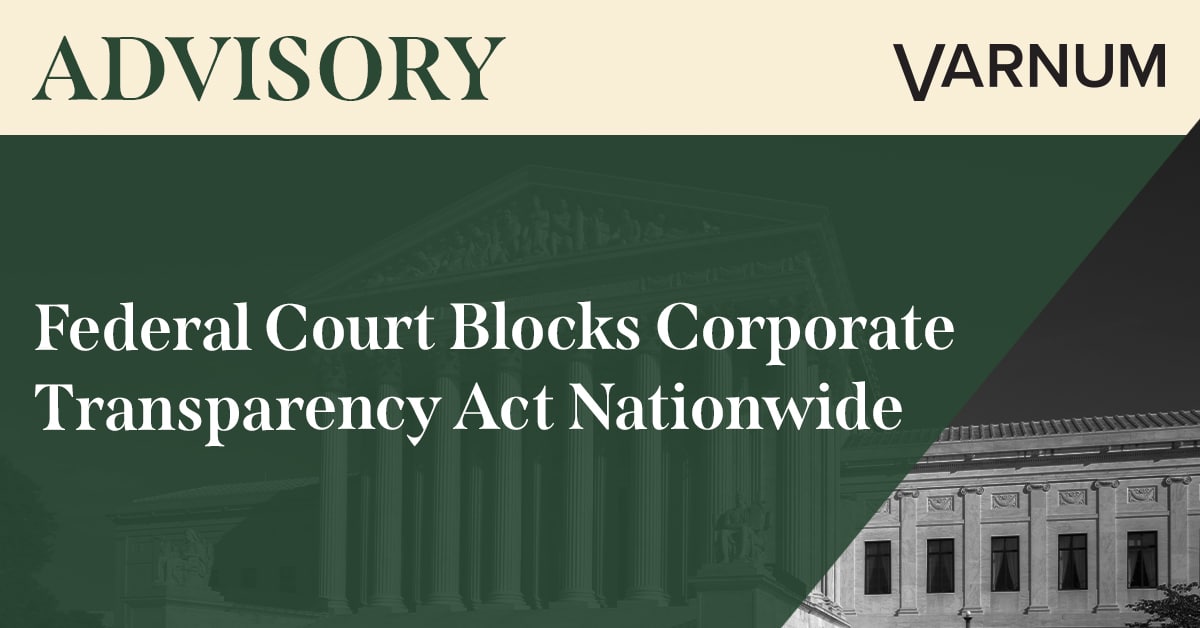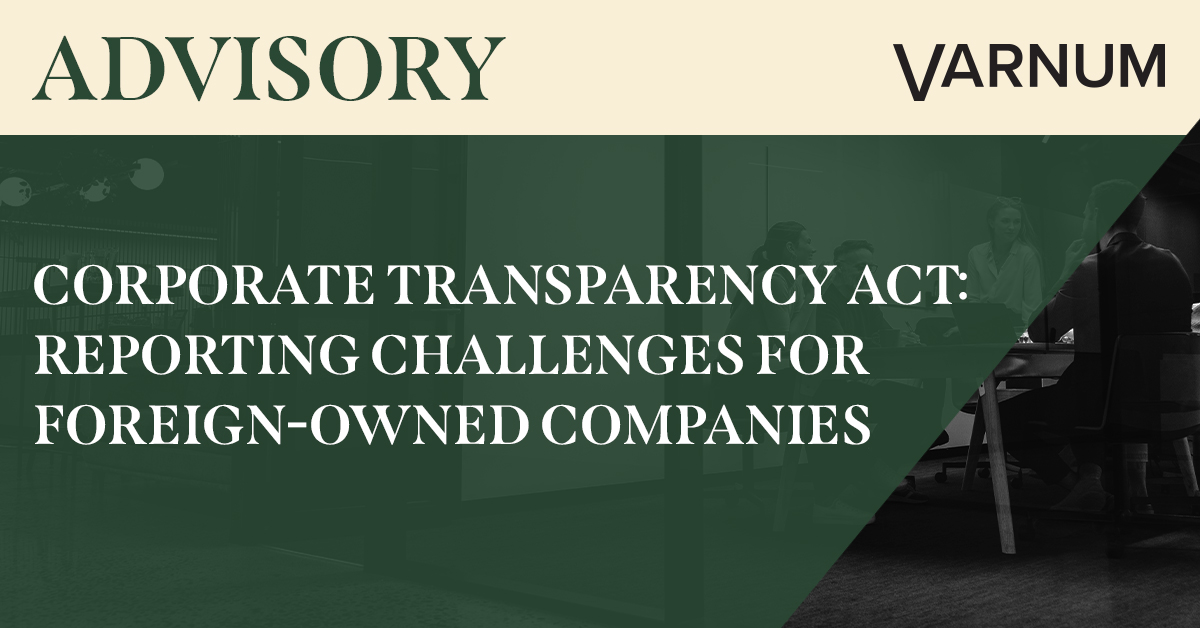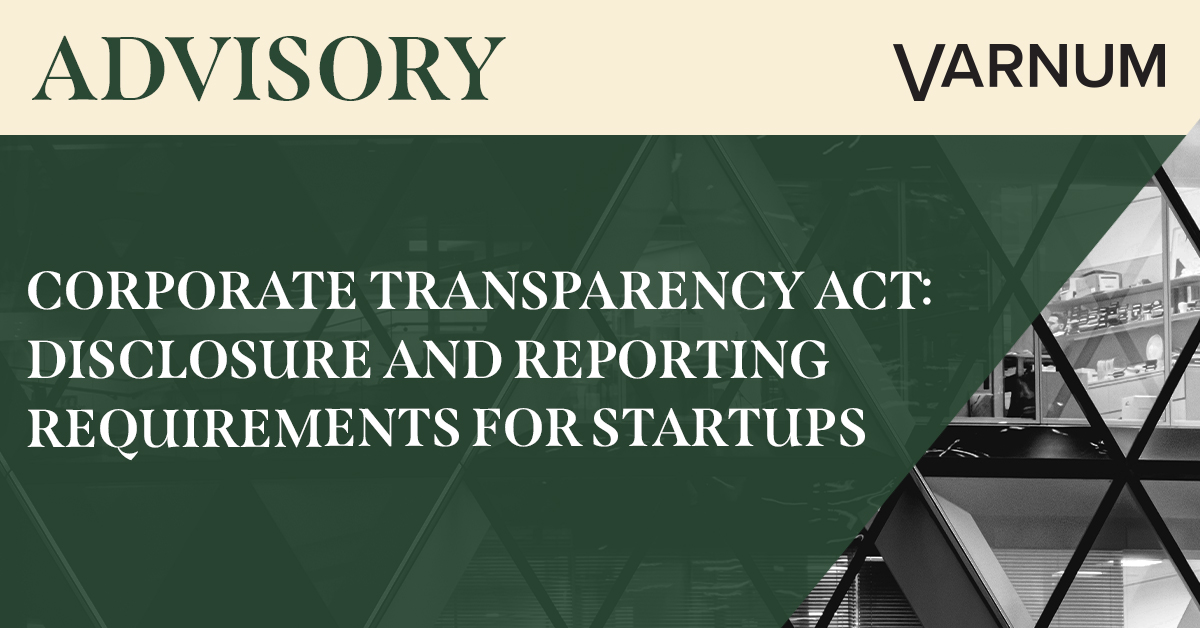On January 1, 2024, the beneficial ownership information reporting rule (BOI Rule) issued under the Corporate Transparency Act (CTA) came into effect, ushering in new reporting requirements for companies formed in the U.S. or registered to do business in the U.S. (collectively, reporting companies).
The CTA and BOI Rule require the collection and disclosure of information identifying the individuals who beneficially own or exercise substantial control over reporting companies. While this task will be a burden for all types of reporting companies, the CTA and BOI Rule pose unique challenges for some foreign-owned companies, which often have complicated beneficial ownership structures, regular changes to management teams, a strong commitment to compliance measures, and a desire to avoid corporate liability and personal liability for members of their management team.
New CTA Reporting Requirements
As explained in a prior advisory, the new beneficial ownership information (BOI) reports will include: (a) for the reporting company, the name, trade name, address and employer identification number (EIN) or taxpayer identification number (TIN) of the reporting company; (b) for each individual who beneficially owns or controls 25% or more of the equity of the reporting company or exercises substantial control over the reporting company (each, a beneficial owner), his or her full legal name, date of birth, complete U.S. residential address, and information from (along with an image of) the individual’s unexpired U.S. passport, state driver’s license or other government-issued identification document; and (c) for certain individuals responsible for the formation of a reporting company on or after January 1, 2024, similar information to that required of beneficial owners.
The CTA and BOI Rule require reporting companies formed or registered to do business in the U.S. on or after January 1, 2024 to file a BOI report with the Financial Crimes Enforcement Network (FinCEN) of the U.S. Department of Treasury within 90 days of its formation or registration (or, if formed or registered to do business in the U.S. on or after January 1, 2025, within 30 days of its formation). Reporting companies formed or registered to do business in the U.S. prior to January 1, 2024 receive a slight reprieve – they need to file a BOI report on or before January 1, 2025.
Once a reporting company has filed an initial BOI report, it must file an updated BOI report within 30 days of any change in the information required to be reported to FinCEN, including changes to reported BOI.
Limited Exemptions for Foreign-Owned Companies
The CTA includes 23 exemptions from the BOI reporting requirements; however, only a handful of them are likely to apply to foreign-owned companies, including the following:
Large Operating Company
Entities that directly employ more than 20 full time employees in the U.S., have an operating presence at a physical office in the U.S., and have filed a federal income tax return or information return demonstrating more than $5 million in gross receipts or sales from sources within the U.S. are classified as “large operating companies” and are exempt from BOI reporting. However, any failure to maintain employment or revenue figures will trigger filing requirements. Additionally, the company will need to be the owner or lessee of real property in the U.S., distinct from unaffiliated businesses, at which it conducts business to satisfy the “physical office” requirement—post office boxes and registered agent addresses will not suffice.
Publicly-Traded Company
Entities that have issued securities registered under Section 12 of the Securities Exchange Act of 1934 (1934 Act) or that are required to file supplementary and periodic information under Section 15(d) of the 1934 Act are exempt; however, this exemption will not cover entities that are listed only on a foreign exchange that do not have reporting obligations under the 1934 Act.
Subsidiary of Exempt Company
Entities whose ownership interests are entirely controlled or wholly owned, directly or indirectly, by certain enumerated exempt entities are themselves exempt, meaning that if a qualifying parent company is exempt, its subsidiaries may also avoid reporting requirements.
Importantly, no “upward” exemption to BOI reporting requirements exists for holding companies.
Reporting Challenges for Foreign-Owned Companies
Foreign-owned reporting companies that are not eligible for an exemption should keep the following issues in mind as they work with advisors to build a compliance plan for CTA reporting:
Analyzing all Members of Corporate Family
Foreign companies often establish a U.S. corporate presence by creating a holding company organized under the laws of Delaware or another U.S. state, with operations conducted through one or more subsidiaries. A compliance plan will be necessary for each entity formed under the laws of a U.S. state or registered to do business in a U.S. state to ensure that it is either exempt or that proper measures have been taken to comply with reporting requirements. Because privately held holding companies do not qualify for an exemption, reporting may be required at that level even if operating entities lower in the family tree are exempt as a “large operating company” or (for lower-tier entities) a “subsidiary” of any large operating company.
Monitoring Triggers for Updates
- Some foreign-owned companies rotate executives through director, officer and managerial roles with their U.S. subsidiaries after a limited period of time. These changes will trigger requirements to file updated BOI reports within 30 days of the change. Further, regular changes in U.S. leadership underline the importance of having a compliance plan in place for incoming executives to ensure that all necessary updates to BOI reports are timely filed.
- For purposes of filing BOI reports, beneficial ownership of equity is reported by looking through legal entities to identify individual owners or controllers of equity. Changes to a capitalization table of a parent entity organized and operating entirely outside of the U.S. may therefore trigger an obligation to file an updated BOI report in this country.
Inactive Entities
Foreign companies may own U.S. subsidiaries that were previously active but no longer conduct substantial business. While there is an exemption from reporting requirements for certain inactive entities, it is not available to companies owned by foreign persons. Owners of inactive entities should consider dissolving these entities prior to the deadline of any BOI report to avoid incurring reporting obligations or penalties for non-compliance.
Data Protection and Confidentiality
Reporting companies should consider how they will comply with data protection obligations and confidentiality requirements associated with the collection of personally identifiable information gathered pursuant to the CTA. It may be beneficial to designate a third-party provider to collect and store this information or direct persons to obtain a FinCEN identifier to mitigate risks associated with data protection, which can be costly. Companies may also need to consult local counsel in certain foreign jurisdictions to ensure that the collection and transmission of sensitive data from persons outside the U.S. is conducted in accordance with local law.
Access to Information for Disclosure
Foreign-owned reporting companies should consider including language in their formation and governance documents, employment agreements and employee handbooks that requires individuals to provide information necessary to facilitate CTA compliance. As changes to ownership of foreign parents may trigger update reporting obligations, similar measures may need to be considered with respect to parent companies. The reporting company should be prepared to take action to compel such disclosure, where possible, to avoid liability to the company and personal liability to senior officers.
Penalties for Non-Compliance; Personal Liability for Senior Officers
Those who disregard the CTA may be subject to civil and criminal penalties. A person who willfully fails to file a correct and complete initial BOI report or an updated BOI report required by law is subject to a fine of $500 per day (up to a maximum fine of $10,000) and is subject to imprisonment for up to two years. FinCEN has stated that senior officers of entities that willfully violate the CTA and BOI Rule may be held liable under these penalty provisions.
Varnum’s Corporate Transparency Act Taskforce of attorneys and other professionals can assist you. Contact Greg Wright of our Business and Corporate practice team, any member of Varnum’s CTA Taskforce, or your Varnum attorney to learn more.
